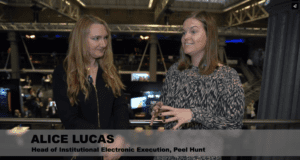 The retail investment session at FIX EMEA 2023 last week dubbed itself “the panel of inspiration” – and with a full hall and standing room only, it was clear that the topic has made itself relevant to a broad swathe of the industry. Moderated by Dr Robert Barnes, the panel explored the increasing importance of the retail investor space on the institutional market – and why incumbent players cannot afford to ignore its influence.
The retail investment session at FIX EMEA 2023 last week dubbed itself “the panel of inspiration” – and with a full hall and standing room only, it was clear that the topic has made itself relevant to a broad swathe of the industry. Moderated by Dr Robert Barnes, the panel explored the increasing importance of the retail investor space on the institutional market – and why incumbent players cannot afford to ignore its influence.
The panel kicked off with a brief survey that illustrated the integral part that retail plays. Almost three quarters (70%) of the crowded room confirmed that they traded on their own account, with around 86% self-designating as retail, while 14% termed themselves professional investors. When it came to equities, around 58% used their retail service provider (RSP) quotes, while 38% used orderbooks and 4% still used voice trading over the phone. Crucially, 95% of the audience confirmed that their broker did not offer direct access to midpoint order books for trading, while 80% said their broker/wealth manager did not provide them with execution quality analytics.
The results highlighted one of the key challenges within the retail trading space – the unequal availability of information. “We urgently need to improve retail access to market data, at affordable prices,” said a panellist.
Another challenge is the difference in retail culture between different regions. While the US and Asia are very retail-centric, and investing is seen as both accessible and exciting (one panellist noted that “all the sexy stocks are American”) – while in the UK and Europe, investing is seen as far more difficult to access and the markets are dominated by institutional players.
“In the US, retail trading is fun. How do you change attitudes in Europe to drive retail trading?” asked a panellist.
In the US, one panellist cited a figure from Nasdaq suggesting that around 34.5% of the market was retail, while between January and February, $1.5 billion per day flowed into US stocks from retail investors – driven in part by strong Asian appetite. But the same is not happening in Europe.
“In 2000, 39% of UK pensions were in UK equity. In 2020, just 4% of UK pension money was in UK stocks. The trend is very much a downward decline,” said a panellist.
However: “It’s not always helpful to compare Europe and the UK to the US, especially with regards to market structure and investor culture,” warned another. “In Europe, there has always been a heavy bias towards savings accounts rather than using financial markets. If we want to solve the issues that Europe faces in terms of retail participation, it might be better to focus on the specific challenges rather than on comparisons.”
According to figures provided by a retail investor platform, pure volumes traded in retail pre-Covid stood at around £300-400 million. During Covid, that spiked to well over £1 billion per day – but post-Covid, those volumes have now normalised back to pre-pandemic levels. By comparison, US volumes did not sink back, but remain higher than pre-Covid times. “Why are all these people no longer to looking to invest?” asked a panellist
In order to encourage retail participants into the trading space, urged the panel, existing market participants must work harder to join the dots and provide access. “It’s shocking to think that an institutional algo can’t trade retail because there still isn’t a platform that allows this,” said one. “It’s 2023 – what’s going on?”
Market makers also have a role to play – by providing liquidity to retail platforms, and by setting up specific models to serve retail customers. However, some panellists raised concerns around the European single market maker model, often seen in Germany, where a trading venue is set up as a multilateral exchange but has just one market maker that serves all retail brokers on the venue – resulting in a lack of competition for that order flow. “The regulation tends to focus on payment for order flow (PFOF) when really, it should be looking at the anti-competitiveness issue,” said a panellist.
Read more – Peel Hunt’s Alice Lucas on retail investor involvement
Education is another crucial element of retail access: both early education at school level, and investor education through access to market data. The London Stock Exchange, for example, has waived market data access fees for retail brokers – but the panel still emphasised that the playing field needs to be levelled across Europe with regards to both education and issues such as PFOF.

Alice Lucas of Peel Hunt and Laurie McAughtry of The TRADE talk retail investment at FIX EMEA 2023
“When it comes to investor education, it’s incumbent on institutions to get more involved. We need to cater to the shorter attention spans of younger investors, through new channels such as social media,” suggested one panellist.
In the UK, another step that could encourage retail investor participation might be a review of the current stamp duty reserve tax (SDRT) treatment. At the moment, this stands at 0.5% of every share purchased – a prohibitive rate, that can make retail access into a big name very expensive.
“Is there a way that we could ask the regulator to remove stamp tax for the retail investor?” asked one panellist. “Or if not, could it be payable on the way out rather than on the way in?”
Either way, the panel agreed that encouraging the retail market is crucial in order to grow the pie for everyone – and, particularly, to enable the institutional market to access small to mid-cap liquidity.
“At the moment we’ve got a fragmented market. It’s difficult conditions, it’s expensive post-trade. We need to improve the workflows, we need to reduce frictional costs, increase accessibility, and drive technology innovation and infrastructure around execution. That will encourage people to trade, and that will benefit everyone across the market,” concluded a panellist.